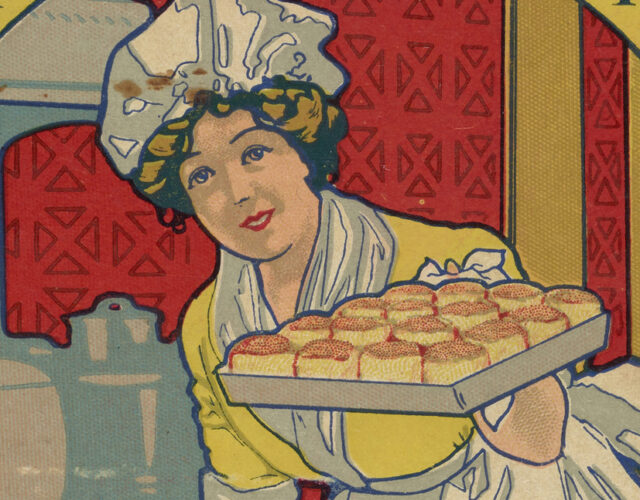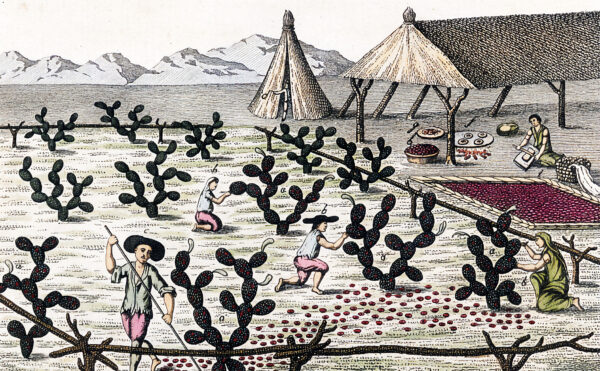Linda Civitello. Baking Powder Wars: The Cutthroat Food Fight That Revolutionized Cooking. University of Illinois Press, 2017. 272 pp. $20.
At his extradition hearing William Ziegler sobbed. The state of Missouri claimed Ziegler, former president of the Royal Baking Powder Company, was a fugitive from justice, and they wanted him back. The charges against him were serious: “feloniously and corruptly devising, contriving, scheming and intending to induce and procure . . . [Missouri state senator] Frank M. Farris to prostitute, abuse and betray his trust and violate his duty as a member of the said State Senate.” In short, bribery. The brief read dramatically that “the man who bribes the official aims at the assassination of the commonwealth itself” and that those who buy favor were as “wicked” as murderers. It was all too much for the defendant.
Ziegler had been the brains behind Royal Baking Powder. He started there as a salesman, though he became much more than that: he was the company’s advertising genius, its marketing guru, and eventually its president. He also dabbled in bribery. Though New York refused to send him back to Missouri, Ziegler was absolutely guilty, and it wasn’t just Farris who had received bribes. The big payoff went directly to the president of the Missouri Senate, Lieutenant Governor John Lee, who gave the money to Farris, who put it in a slush fund. Why were Ziegler and Royal Baking Powder greasing palms in Missouri? They wanted to make their competitors illegal. And they succeeded.
Baking powder is a pretty simple mixture: baking soda (a base), an acid, and a buffering material to keep the two from reacting before use. The buffer is usually cornstarch or flour; the acid can vary. At the time of Ziegler’s extradition hearing in 1903, Royal used cream of tartar, but almost everyone else used the cheaper and more potent sodium aluminum sulfate, or alum. Royal tried for years to besmirch alum’s good name, calling it unnatural and poisonous compared with Royal’s own “natural” recipe. (Cream of tartar is a by-product of the wine-making process and could be marketed as “from the grape.”) Yet consumers still preferred alum baking powders despite their “unnatural” origins. If Royal could get alum baking powders outlawed, then its more expensive cream-of-tartar baking powder would be the only product left on store shelves. It was a drastic measure, but all’s fair in love and war, and this was surely war.
Linda Civitello’s Baking Powder Wars: The Cutthroat Food Fight That Revolutionized Cooking covers this and the other battles over baking powder: from getting people to buy it in the first place (they were used to mixing it themselves at home) to alum baking powder companies fighting each other in a brutal price war. But the cream of tartar versus alum debate is the longest-running (and most entertaining) feud detailed in the book.
Baking Powder Wars is also a comprehensive look at the changes in American baking since 1790, when the first ever U.S. patent was issued to a—you guessed it!—chemical leavener. Civitello chronicles the use of different leaveners over the decades and how we slowly made the transition from yeast and emptins (a brewing by-product) to baking powder when making bread; how baking powder led to the rise of light, fluffy cakes that were impossible to make using yeast; and how products such as Bisquick and cake mixes changed the way we bake at home. These sections can drag, however, if you’ve been looking forward to reading about a rollicking baking powder war, so let’s go back to Ziegler and his trial since it’s one of the most interesting parts of the book.
Even though the people of Missouri were clamoring for alum baking powder, their state senators refused to repeal the ban. According to Civitello thousands of merchants had signed a pledge promising to vote only for candidates willing to repeal the law. Senate president John Lee actually wrote to Daniel Kelley, Ziegler’s partner, saying if Royal wanted to stop the appeals process for the alum ban, it would cost the company $15,000. Another time Lee asked Royal for $25,000 for his gubernatorial campaign. And while he was unwilling to stop taking Royal’s money, he still wanted to be seen as a man of the people: on realizing how much Missourians wanted alum baking powder, he began talks with rival manufacturers and promised them his assistance.
These actions incensed our other corrupt politician, Frank Farris. Since Lee wanted to play it both ways, Farris was determined to make the lieutenant governor publicly pick a side. And so when a vote came up for repealing the alum ban, Farris made sure just enough senators were off the floor so that the vote would be a tie. The tiebreaking vote, of course, belonged to Lee. Lee wanted to be governor of Missouri, and he couldn’t do that by keeping alum baking powder from the masses. But he had taken so much of Royal’s money he couldn’t throw the company under the bus either. Farris took great delight in seeing Lee squirm before finally greed won out: Lee voted to maintain the ban, in favor of Royal.
When the bribery was discovered and the story broke in the papers, Lee up and vanished. That’s right—the lieutenant governor fled the state! He returned after about a week and started naming names to a grand jury. His testimony is how Missouri knew to go after Ziegler and Kelley, who by then had hightailed it out of Missouri as well: Ziegler was safe in New York, and Kelley made it all the way to London.
The irony of all this was that Royal was secretly making its own alum baking powder and selling it across the South. For all the company’s attempted bans and claims that alum baking powder was harmful to users’ health, its alum baking powder had cornered two-thirds of the Southern market. Needless to say, this fact incensed people even more when it was uncovered. At the Eighth Annual Convention and Pure Food Congress of the National State Dairy and Food Departments, speakers lambasted Royal’s motives, with one saying the company “did not want these wicked alum baking powders that they are selling in the south to invade the north. That is why they are willing to kill off the people of the south and save the northern people.”
Alum doesn’t kill you, of course. The only thing it killed off was cream-of-tartar baking powder. The baking powder you have at home has alum in it, and you haven’t been poisoned yet. But for a while it was a heck of a fight, full of misleading advertisements, phony articles in Scientific American, questionable legal tactics, a three-person National Health Society made up of Royal executives, and industrial espionage. (Boy, was Calumet surprised when four of its top salesmen turned out to be spies for Royal!)
If these are the sorts of stories that interest you, you’ll enjoy about half of this book. If you’re interested in the history of American baking, you’ll also enjoy half of the book—just not the same half.






